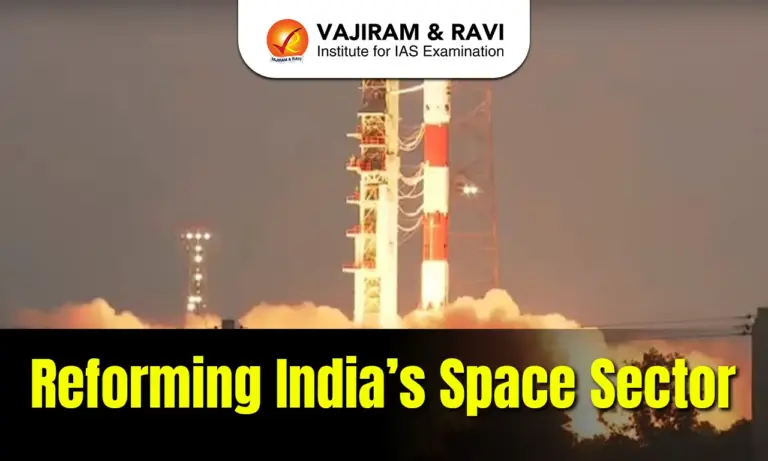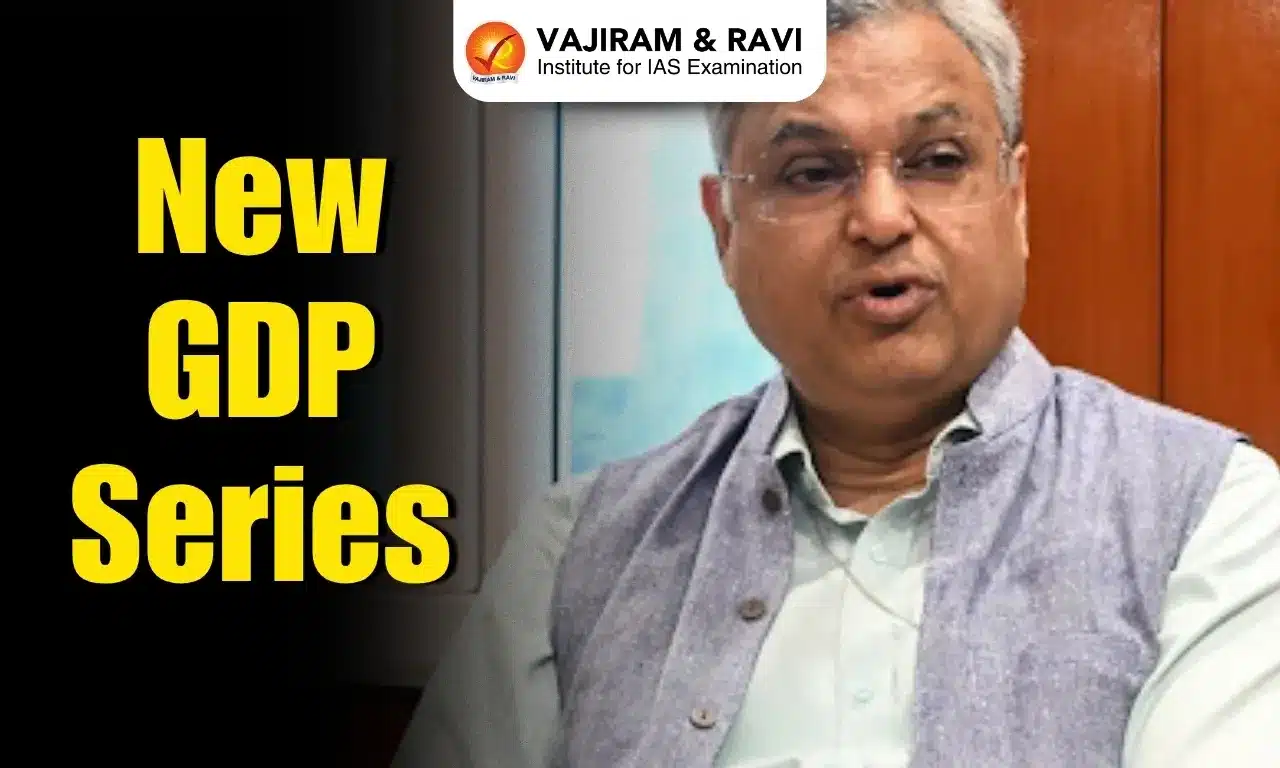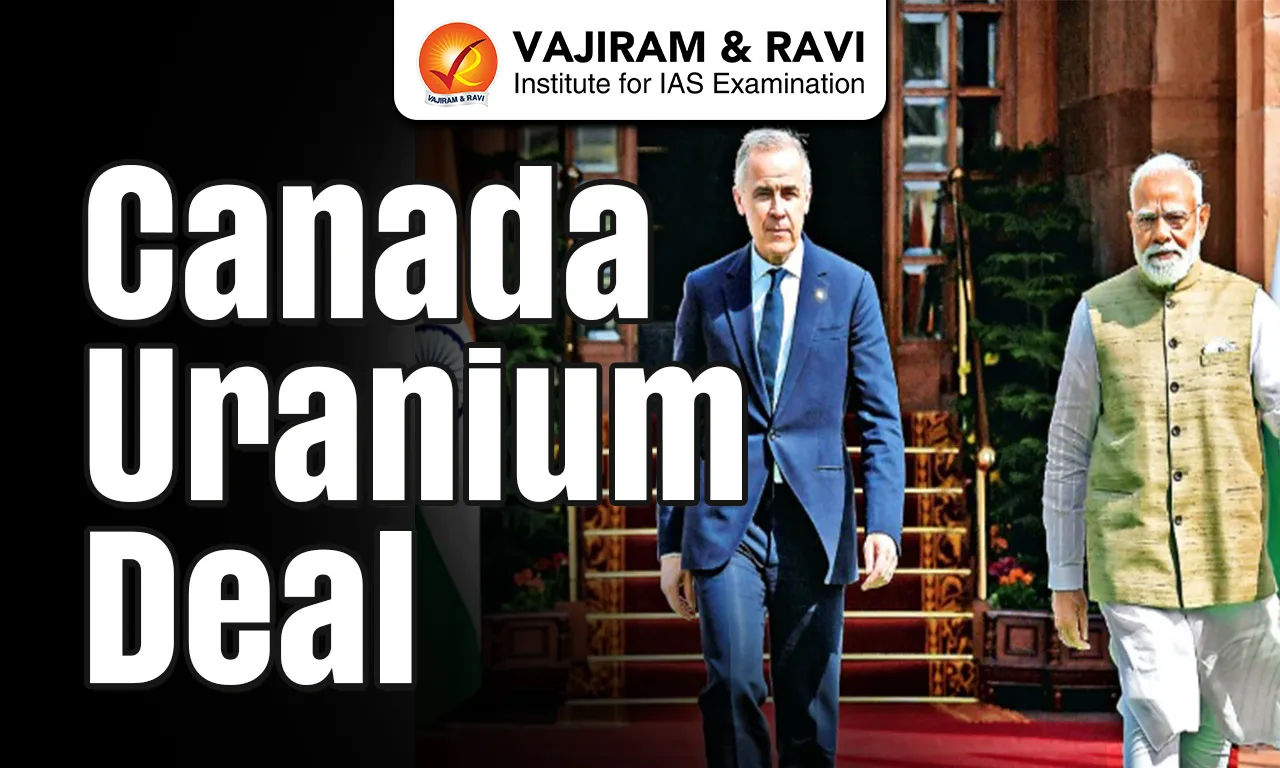Reforming India’s Space Sector Latest News
- India is finalising a new Space Activities Bill, aimed at establishing a legal framework for private participation in the space sector and granting statutory authority to IN-SPACe (Indian National Space Promotion and Authorisation Centre).
- The bill reflects evolving needs in the wake of increasing private sector involvement and international obligations.
Background and Need for the Bill
- Previous attempts and policy evolution:
- First draft in 2017: Circulated for public comments but not finalised or introduced in Parliament.
- IN-SPACe: Established in 2020 to promote private participation.
- Indian Space Policy 2023: Outlines roles and responsibilities of different entities in the Indian space sector.
- Current developments: The new draft bill, which is now ready for circulation among stakeholder ministries, integrates past suggestions and addresses the growing complexity of private space activities.
Purpose and Key Objectives of the Draft Bill
- Statutory empowerment of IN-SPACe:
- Currently, IN-SPACe operates without statutory authority.
- The bill will provide legal backing for authorisation and regulation of private space companies.
- Regulatory necessity:
- India, being party to international treaties (like the Outer Space Treaty, 1967), is accountable for all space activities under its jurisdiction.
- Proliferation of private players necessitates legislation to regulate space activities.
Provisions and Changes in the Draft Bill
- Revised from 2017 version:
- Earlier provisions have been amended based on industry feedback.
- These include –
- 3-year imprisonment and Rs 1 crore fine for offences such as carrying out a space activity without a license, furnishing false information, or polluting the outer space.
- Any intellectual property right created in outer space would belong to the government.
- The bill now reflects a more enabling, industry-friendly framework.
- Insurance for space assets:
- Currently, the cost of insuring space assets and space activities is very high, making them unaffordable for upcoming start-ups.
- The bill aims to include provisions for accessible and affordable insurance, critical for start-ups and new entrants.
Economic Goals and Projections
- India’s space economy targets:
- Current space economy: $8.4 billion (2022).
- Target for 2033: $44 billion, with $11 billion from exports.
- Significance of the bill: It is seen as a catalyst for growth and investment in the space sector.
Consultation and Approval Process
- After the internal consultation with the stakeholder ministries, the draft bill will be sent for a wider consultation to different ministries and then shared with the general public.
- The final draft will go to the minister in-charge, which is the Prime Minister (PM) in this case.
- Once it is approved, it will go to the cabinet and then the parliament
State-Level Initiatives
- Decentralised space manufacturing: Aim is to set up 4-5 manufacturing hubs initially, with IN-SPACe’s guidance.
- State policies and specialisation:
- Three states have released their own space policies – Tamil Nadu (focus on launch vehicles), Gujarat (focus on satellites and payload), and Karnataka (general hub due to the existing ecosystem in Bengaluru).
- IN-SPACe is also in talks with Maharashtra and possibly other states to set up such manufacturing hubs.
Conclusion
- The new draft Space Activities Bill represents a crucial legislative advancement towards modernising India’s space governance, unlocking private sector potential, and meeting global responsibilities.
- It promises to make India a major player in the global space economy by fostering innovation, investment, and regulatory clarity.
Reforming India’s Space Sector FAQs
Q1. What is the primary objective of the new draft Space Activities Bill in India?
Ans. The primary objective is to provide a comprehensive legal framework for regulating private sector participation in India’s space sector and to grant statutory powers to IN-SPACe.
Q2. Why is a legal framework necessary for space activities in India despite the Indian Space Policy 2023?
Ans. A legal framework is necessary to fulfill India’s international treaty obligations and ensure accountability for space activities conducted within its jurisdiction.
Q3. How does the draft bill address the concerns of the private space industry regarding insurance?
Ans. The bill includes provisions to enable accessible and affordable insurance for high-value space systems, a key demand of private players.
Q4. What role will state governments play under the new space ecosystem proposed in the bill?
Ans. State governments will establish space manufacturing hubs with specialisations, supported by incentives from the Centre through IN-SPACe.
Q5. What are the economic targets associated with India’s space sector as envisioned in the draft bill?
Ans. The bill supports India’s ambition to grow its space economy to $44 billion by 2033, including $11 billion in exports.
Source: IE
Last updated on March, 2026
→ UPSC Notification 2026 is now out on the official website at upsconline.nic.in.
→ UPSC IFoS Notification 2026 is now out on the official website at upsconline.nic.in.
→ UPSC Calendar 2026 has been released.
→ UPSC Final Result 2025 is expected to be released soon.
→ Check out the latest UPSC Syllabus 2026 here.
→ Join Vajiram & Ravi’s Interview Guidance Programme for expert help to crack your final UPSC stage.
→ UPSC Mains Result 2025 is now out.
→ UPSC Prelims 2026 will be conducted on 24th May, 2026 & UPSC Mains 2026 will be conducted on 21st August 2026.
→ The UPSC Selection Process is of 3 stages-Prelims, Mains and Interview.
→ Prepare effectively with Vajiram & Ravi’s UPSC Prelims Test Series 2026 featuring full-length mock tests, detailed solutions, and performance analysis.
→ Enroll in Vajiram & Ravi’s UPSC Mains Test Series 2026 for structured answer writing practice, expert evaluation, and exam-oriented feedback.
→ Join Vajiram & Ravi’s Best UPSC Mentorship Program for personalized guidance, strategy planning, and one-to-one support from experienced mentors.
→ Check UPSC Marksheet 2024 Here.
→ UPSC Toppers List 2024 is released now. Shakti Dubey is UPSC AIR 1 2024 Topper.
→ Also check Best UPSC Coaching in India
Tags: mains articles reforming india’s space sector upsc current affairs upsc mains current affairs


















